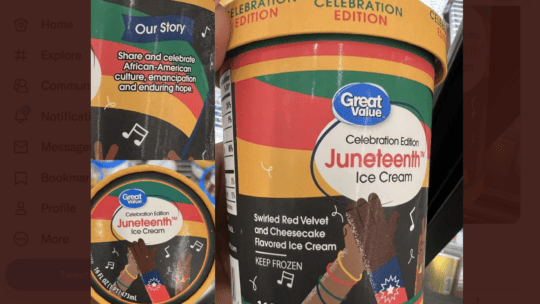
Walmart just can’t seem to learn from its Juneteenth mistakes.
In 2021, The New York Times published an op-ed striking Walmart for marketing Juneteenth-branded t-shirts. Kaitlyn Greenidge wrote about her sadness over the holiday's commodification.
“I am sad because when a holiday becomes co-opted like this, those who can gain a sense of self and solidarity from celebrating it often lose it. The agency that comes from deciding your own traditions...becomes lost to a corporate calendar and a megastore selling you a Juneteenth cookout checklist.”
Well, Walmart decided to go a different route this year—selling ice cream. Under its Great Value label, Walmart released a product called Celebration Edition: Juneteenth Ice Cream. Copy on cartons of the red velvet cheesecake ice cream read: "Share and celebrate African-American culture, emancipation and enduring hope."
Almost needless to say, Walmart apologized May 24, just days after the ice cream's debut.
It’s nothing new for brands to garner attention through themed messaging and marketing tactics; however, some consumers have reached a new level when it comes to commodification of causes.
Some campaigns are fun—think Taco Bell’s “Steal a Base, Steal a Taco” during Major League Baseball's World Series. Others leave us confused, such as the man who threw cake at the Mona Lisa recently. His goal was garnering attention about the growing climate crisis.
“All brands want to be original and garner attention,” says Lana McGilvray, founder and CEO of Purpose Worldwide. “But, standing out is only positive when the reaction is positive or compels actual action. Otherwise, it can cost brand equity, consumer trust and dollars, as was the case with Walmart.”
All the Right Messaging Moves
If your organization or brand wants to make a splash around a cultural holiday, there are steps to make sure you are creating an appropriate campaign. McGilvray suggests these simple best practices:
- be authentic to your brand
- speak to your audience and
- test before you go widely public
“Knowing your brand and knowing your audience" are keys "because some audiences have a high tolerance for shock and surprise. Others don't. Testing is helpful,” she says.
Wendy J. Roundtree, founder and lead strategist of Jarel Communications, who works on the front lines of affordable housing, education, health and wellness, race, equity and social justice, suggests asking how your company can help solve a problem, rather than merely join a conversation.
“Ask the hard questions,” Roundtree says. “What problem are we addressing? Why are we taking a stand? And how can we influence positive change by our involvement? Marketing tactics are easy. Real impact requires a long-term investment in clear messaging about the problem and the solution.”
Not all Holidays are a Fit
Sometimes it’s best to say nothing. Take a backseat and let the holiday's true nature, meaning and celebrants have their time. In the case of Juneteenth, give employees a vacation day.
Sheryl Daija, founder and CEO at BRIDGE, a trade group focused on helping companies and organizations identify and bridge their DEI gaps, is vehemently against cultural appropriation.
“Creating economic opportunities for your brand based on a culture you are neither attached to nor authentically committed to is simply just the wrong thing to do,” Daija says.
BRIDGE wrote an open letter to Walmart executives about its Juneteenth ice cream. Daija outlined the company's mistakes and suggested fixes. Episodes like Walmart's inappropriate ice cream are avoidable, Daija believes.
“So many good intentions can quickly go awry when you don’t have diverse, listened-to voices at the table,” she says. Diversity experts weighing in on cultural commemorations and celebrations is "essential" when a company wants to create "appropriate, relevant programs."
In addition, make sure your DEI effort includes action, not just words. “Create a [campaign] that authentically shows your commitment...." For instance, Daija suggests funding "economic opportunities for Black-owned companies" or creating scholarships for Black students, instead of having the brand benefitting from culturally-appropriated products.
Nicole Schuman is senior editor for PRNEWS. Follow her @buffalogal
